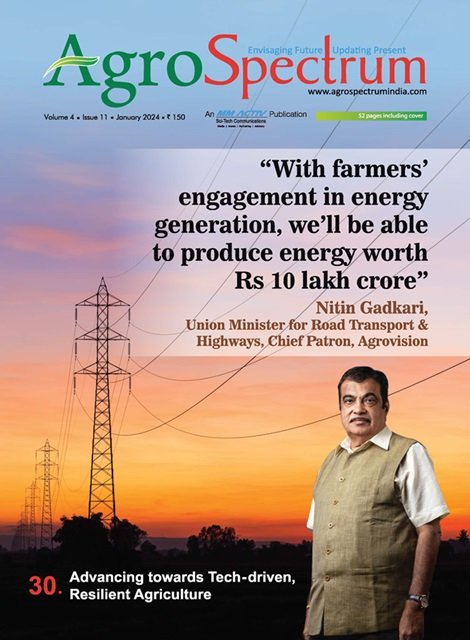“With farmers’ engagement in energy generation, we’ll be able to produce energy worth Rs 10 lakh crore”
– Nitin Gadkari, Union Minister for Road Transport & Highways, Chief Patron, Agrovision
At the 14th Agrovision Summit, India’s Premier Agri Mega Event, held between November 24 and 27, 2023 at Panjabrao Deshmukh Krishi Vidyapeeth (PDKV) Ground, Dabha, Nagpur, AgroSpectrum had the opportunity to interact with the stalwart politician and Chief Patron of Agrovision, Nitin Gadkari, Union Minister for Road Transport & Highways. Gadkari shared his views and ideas to further the aspirations of India’s farmers and citizens alike. His zeal for the empowerment of farmers, focusing on innovations that can benefit the farmers and the agriculture sector at large has, as always, been profound. Edited excerpts:
Could you describe your experience at the recently held 14th Agrovision?
Like the previous 13 editions of Agrovision, the recent edition of this event has also contributed in many ways. Several initiatives were taken in the Agrovision on the technology and information front and efforts were made to ensure that they reach farmers. In the Vidarbha region, where 22 sugar mills had gone into liquidation, I am running three sugar mills. Farmers in Vidarbha are producing nearly 105 tonnes of sugarcane per acre. Our efforts are now to scale up the production to 15 quintals of Soyabean and 20 quintals of cotton per acre. The requirement of orange saplings across India is 2 crore and Vidarbha needs 50 lakh saplings of oranges. But the capacity of the local organisation is only 3 lakhs. We have taken initiative to increase the production of saplings through public-private partnership (PPP) mode & accordingly appointed 12 private agencies to produce disease free good quality saplings. Now they are producing 30 lakh saplings. Efforts are being made to increase it. The National Dairy Development Board (NDDB) is setting up a Rs 537 crore mega milk processing plant in Butibori, Nagpur, which will have a capacity to process up to 10 lakh litres of milk per day. Its foundation stone was laid during the 14th Agrovision. This indicates that the NDDB is confident of procuring this much milk in Vidarbha. This is happening due to a conference on dairy development which we organise every year during Agrovision. In addition to the information and training for more and better-quality production, this year we have stressed value addition through processing and forming Farmers Producers Companies (FPCs) for marketing. Special sessions were organised for the same.
This Agrovision also saw some very interesting products like bamboo chip machines to make white coal, cars and bikes running totally on ethanol, biodiesel-based power generation sets and small tractors. What we were telling the farmers till now, has begun to bear fruit. Of course, we cannot be complacent and stop here. Our efforts to reach farmers with new information, new thought and new technology will have to continue. That work is now being done throughout the year by the Agrovision Foundation.
You have been talking about the diversification of agriculture towards the energy and power sector. How will it leverage the agriculture sector in India?
Yes, I keep speaking about this on every forum. I have been telling the farmers not only to be “Anna data”, a food provider, but also “Urja data”, an energy provider. Farmers can even supply bio-based Bitumen and aviation turbine fuel. It is possible with the diversification of agriculture towards energy, fuel and power. It is the current need of the country, considering its huge oil import bill worth Rs 16 lakh crore. It will also help farmers to get higher incomes. Their lives cannot change merely by growing wheat, rice and bajra as their prices remain the same, whatever quantity one produces. The surge in demand for ethanol, which is blended with petrol and diesel, will have transformative effects on India’s agricultural sector. Almost 65 per cent of the population relies on agriculture which contributes only 12 per cent to the country’s Gross Domestic Product (GDP). This underlines the potential for the ethanol industry to revitalise the agricultural economy. With farmers’ engagement in energy generation, we will be able to produce energy worth Rs 10 lakh crore.
Bamboo can be used for making ethanol and it can create 10 lakh jobs. Moreover, Bamboo chip-making machines can be used to make white coal. During the recent Agrovision, I announced that we would buy bamboo from farmers at the rate of sugar cane. It is my dream to see an ethanol petrol pump being run by farmers.
What needs to be done to achieve the goal of making India a $5 trillion economy in future? What role can the agriculture sector play in it?
We are amongst the largest growing economies in the world. To realise Prime Minister Narendra Modi’s dream of making our country a $5 trillion economy, we need tribal, rural and agriculture-centric research and innovation. There had been a migration of people from rural areas to urban centres. Nearly 90 per cent of people used to live in villages. That number has come down to 65 per cent. People have not migrated happily. They shifted because of the problems in villages. So, we need to change the face of villages by bringing prosperity to the rural areas through the diversification of agriculture to the power and energy sector.
While Ethanol can be extracted from biomass, we can create bio-CNG and LNG from agricultural waste. On the other hand, we should ensure value addition in agro crops by processing. Although I mentioned research and innovation, any research must be helpful and have some practical use. It should be more need-based, location and raw material availability-based to be useful for the farmers. With all these combined efforts, it is not difficult for the agriculture sector to contribute substantially to making India a $5 trillion economy.
To read more click on: https://agrospectrumindia.com/e-magazine
- Nitin Gadkari, Union Minister for Road



